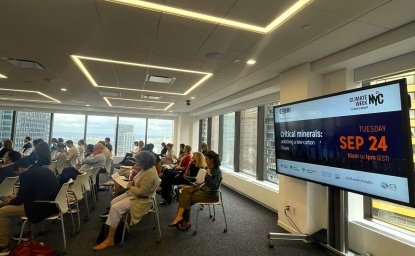Permanent Program to Combat Disinformation in Electoral Justice
One of the main instruments for combating disinformation in the context of Brazilian elections is the Permanent Program to Combat Disinformation, launched by the Electoral Justice.
Since its inception in 2021, the Program has been dedicated to bolstering the credibility of the electoral process, thereby mitigating the detrimental effects of disinformation. It comprehensively targets disinformation related to the Electoral Justice and its members, the electronic voting system, the electoral process in its various stages, and the involved actors. Notably, the Program does not cover disinformation directed at pre-candidates, candidates, political parties, coalitions, and federations unless it threatens the integrity, credibility, and legitimacy of the electoral process.
Building on these efforts, the Program encompasses a range of coordinated actions, including partnerships with digital platforms, academics, the media, and civil society, as well as educational campaigns for the population and official channels for verifying information. In collaboration with key stakeholders, it works to monitor and combat the spread of disinformation, exemplifying how the Electoral Justice is employing a multifaceted approach to tackle the problem of disinformation permanently and strategically.
TSE Resolution and the Use of Artificial Intelligence in the 2024 Elections
Resolution 23.732, which introduced significant regulatory advancements regarding the use of artificial intelligence (AI) in elections, regulates the use of this technology, imposing clear limits and guidelines to guarantee the transparency and fairness of the electoral process. It imposes, for example, the obligation to inform, explicitly, prominently, and accessiblely, about the use of AI in political advertising.
The use of AI, especially in electoral advertising campaigns, has raised global concerns about the manipulation of information and the automated creation of misleading content. The 2022 Brazilian Presidential Elections were marked by extensive use of bots to falsify a sense of support for various candidacies. In the first days of the campaign, around 50% of the retweets in support of a candidate were generated by automation.
Aware of these challenges, the TSE has regulated the use of this technology, imposing clear limits and guidelines to guarantee the transparency and fairness of the electoral process. The resolution seeks to prevent AI tools from being employed in ways that undermine the integrity of public debate, particularly in a context where bots and algorithms can amplify disinformation.
It is undeniable that significant progress has been made with the TSE resolution. However, some of the points highlighted deserve deep reflection to bring them into line with the Constitution and even with federal laws, otherwise, due to open clauses and indeterminate legal concepts, technical-operational obstacles will be created for the proper moderation of content, generating legal uncertainty and the possibility of prior censorship of all actors participating in the electoral process.
Disinformation Alert System against the Elections
Another innovation is the Electoral Disinformation Alert System (SIADE), designed to facilitate the detection and prompt response to false content that could influence the electoral process. Operating with various digital platforms, media companies, and fact-checking agencies, the system keeps the Electoral Court informed about disinformation campaigns.
Functioning like a radar, SIADE captures data in real time, enabling authorities to issue public alerts and actively correct disinformation. This system facilitates a coordinated reaction between electoral justice and technological partners, reinforcing the dialogue with civil society about the necessity of fact-checking.
Integrated Center for Confronting Disinformation and Defending Democracy
The Integrated Center for Confronting Disinformation and Defending Democracy involves coordination between the TSE, the STF, the Ministry of Justice, and various other public and private institutions. The center operates as an intelligence hub focused on analyzing, monitoring, and responding quickly to disinformation campaigns, especially those aimed at delegitimizing democratic institutions.
In addition to monitoring the spread of disinformation, the center's mission is to protect public confidence in the Brazilian electoral system. Through collaboration with fact-checking agencies and social media platforms, it seeks to dismantle disinformation networks that aim to undermine the country's democratic stability.
STF Disinformation Combat Program
Alongside the initiatives led by the TSE, the Supreme Federal Court has developed its own Disinformation Combat Program, initiated in 2021. It was created to combat practices that affect public trust in the Supreme Court, distort or alter the meaning of its decisions, and jeopardize fundamental rights and democratic stability, focusing on two areas: organizational action and communication actions.
The STF, frequently targeted by disinformation attacks, has adopted measures to protect its reputation and ensure public confidence in judicial decisions. The program involves legal actions and informational campaigns to combat the circulation of disinformation related to the Court's activities.
The measures include partnering with media outlets to debunk rumors and disinformation as well as promoting transparency in its decisions through direct communication with the public. This proactive approach has been crucial in strengthening confidence in the Brazilian judiciary during a period of intense political polarization and the spread of false information.
Conclusion
The Brazilian Judiciary's initiatives place Brazil at the global forefront, aligned with countries that see digital regulation as crucial for defending democracy. These efforts reflect a proactive approach comparable to other international initiatives combating disinformation.
The approaches outlined in the sections above incorporate elements adopted by European Union institutions in the fight against disinformation, such as multisectoral strategies, the promotion of dialogue and cooperation among the actors involved in the electoral process, and media literacy campaigns.
Despite the progress, the initiatives face practical limitations. The large number of municipalities makes applying and monitoring the measures uniformly difficult. Programs that rely on technological partnerships to detect and correct false content in real-time are not as effective in municipalities with limited technological infrastructure and lower digital literacy penetration.
As the 2024 municipal elections come to a close and attention shifts toward the 2026 presidential race, it is crucial to reinforce these strategies to guarantee public confidence in the electoral system and protect fundamental rights and the country's democratic stability. The fight against disinformation is ongoing, and Brazil, through its judicial institutions, is at the forefront of this global effort.







